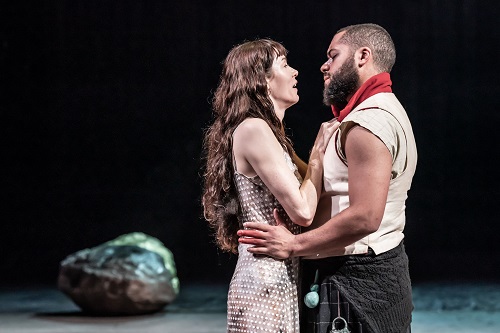Jessica Harris watches the RSC’s latest production.
As opening scenes go, the RSC’s latest production of Macbeth has one of the best. Mist swirls, unseen spirits chant and dissonant music plays. Dead birds drop from the skies. Against this backdrop, the three witches emerge from the stage, breaking through its membrane as if being born from the very earth. We are in the realm of the supernatural and a sense of dread and foreboding has been established.
This atmosphere provides a compelling foundation for the themes that are played out. But the production’s drive and energy come from Reuben Joseph’s portrayal of Macbeth. In a performance full of emotional depth, Joseph shows us the conflicts within the character and the changes that Macbeth goes through over the course of the play. We see his ambivalence as he weighs up his loyalty to the virtuous Queen Duncan with his desire for personal advancement.
Egged on by Lady Macbeth, played by Valene Kane, who accuses him of cowardice, we see his character shift, little by little, from someone troubled by the fate of others into a brutal tyrant prepared to murder innocent babes and infants for his own gain. And so, the complexity of human nature is conveyed, wherein one person can feel both ambition and a desire for power, but also struggle with inner turmoil and guilt.
The three witches take on a major role in this production. Not only do they foretell the tragic events that will unfold, but they are often present on stage as observers of the action, contributing to a sense of fate. But Joseph’s portrayal of Macbeth ultimately leaves little doubt that he is the author of his own downfall, whatever the influence of evil forces around him.
Feelings of fearful anticipation are sustained through musical arrangements which make full use of the bottomless sounds of the tuba, the wail of bagpipes, and the lovely solo voice of Annie Grace. Like the three witches, the music runs throughout the play and seems to comment on the action onstage.
Anna Russell-Martin’s portrayal of Banquo provides an effective foil to Macbeth. Her grounded delivery has a dryness to it that contrasts well with the mania of Macbeth.
The production’s ability to convey violence and brutality is also well delivered. Scenes of warfare are choreographed to add tension, and the atrocity of the murder of Macduff’s wife and children at the hands of Macbeth’s hitmen is exploited to the full, with puppetry used to animate her brood.
In some respects, the production seems uncertain as to where to situate itself. The overriding sense is of a Scotland in the depths of the Middle Ages, and yet some production choices are at odds with this. Whilst most of the killing is done with daggers, the execution of the thane of Cawdor resonates of contemporary terrorist killings. For his ‘Tomorrow, and tomorrow and tomorrow’ speech, Macbeth grasps a microphone for no obvious reason, other than that its cable then serves as a whip which underlines his brutality. And costuming seems to draw on a divergence of styles from rustic tartan to tarpaulin with little obvious rhyme or reason.
Although very much outside of the production’s main setting, the decision to break the sombre mood with a stand-up act by the Porter, written by comedian Stewart Lee, is an ingenious touch which works well as an aside within the wider play. Alison Peebles’ delivery is full of dry wit and contemporary reference. Reverting to the original text, she says: “I pray you, remember the porter.” Yes, we certainly will!
Macbeth was directed by Wils Wilson. The composer was Alasdair Macrae, sound designer was Claire Windsor, and movement and choreography were by Julia Cheng.
It is on at the RSC until 14th October. For further information visit rsc.org.uk.
Pics – Marc Brenner, (c) RSC.
